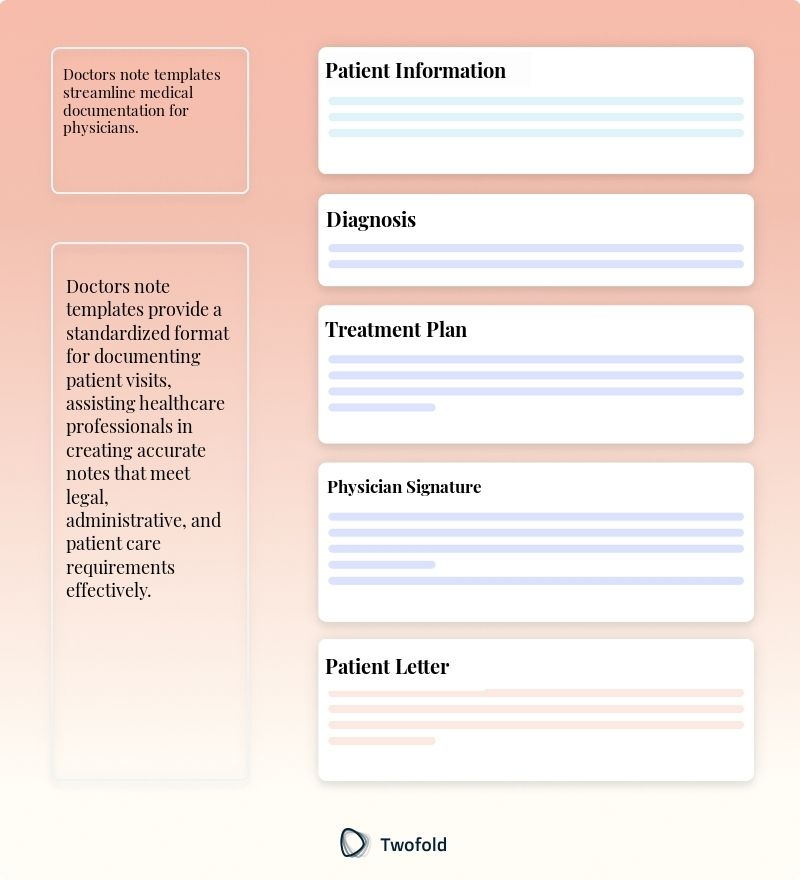
Doctors Note Template
Have you ever found yourself in a bind, needing a doctors note that ticks all the right boxes yet feeling lost in a sea of medical jargon? You're not alone. Whether it's for documenting patient visits or providing necessary proof for employers, creating a quality doctors note can be tricky. But don't worry ‑ we've got the insights to make the process smooth and effective.
What Is a Doctors Note Template?
A doctors note template is a standardized format used by medical professionals to issue a formal document validating a patient's medical condition. It's often necessary for patients who require time off from work or school due to health issues.
This template ensures all essential details are covered, such as the date of consultation, the medical professional's information, diagnosis, and recommendations. It provides a clear, professional framework for issuing notes efficiently.
Key Components of a Doctors Note
A doctors note must include specific sections to maintain its efficacy.
- Patient Information: Name, age, and contact details.
- Medical Professional's Details: Name, qualification, and registration number.
- Date of Consultation: When the examination took place.
- Diagnosis: The patient's medical condition.
- Recommended Action: Prescribed treatment or rest duration.
- Signature: A signature for validity, either hand-written or digital.

How to Use a Doctors Note Template: Step-by-Step Process
Step 1: Fill in Patient Details
Include accurate patient information including full name and age.
Step 2: Include Professional's Information
Ensure the medical expert's credentials are clear, including their unique registration number.
Step 3: Document the Consultation Date
The exact date of the medical visit must be recorded for legal purposes.
Step 4: Write the Diagnosis
Provide a clear and concise description of the patient's condition.
Step 5: Suggest Recovery Plan
Detail necessary actions for recovery, such as rest or specific treatments.
Step 6: Sign the Note
A signature authenticates the document, making it official.
Benefits of a Doctors Note
Benefit | Description |
|---|---|
Professionalism | Establishes a formal and standardized communication method. |
Efficiency | Saves time by quickly providing all necessary details. |
Credibility | Legitimizes absences from work or school. |
Stakeholders in Doctors Note
A medical note affects various individuals and entities related to the patient.
- Patients: For instance, Sarah, a school teacher, uses the note to take a sanctioned rest after a surgery.
- Employers: Dave's boss requires the note to confirm his legitimate absence due to a medical condition.
- Educational Institutions: Emily's university demands a note explaining her absence due to health issues.
Example of a Doctors Note
Below is a sample doctors note, demonstrating the elements detailed in this guide.
Real-World Use Cases: Practical Impact of the Doctors Note Template
Doctors notes can make a significant difference in various real‑world situations.
- James, recovering from an accident, presents a note to secure paid sick leave at his job.
- Annie's upcoming exams require a rest period, validated by a doctor's note, ensuring her timely recovery.
- Maria's childcare leave gets approved when she submits the doctor's note detailing her child's health condition.
Conclusion
A well‑crafted doctors note is more than just paperwork. It serves as a vital document that communicates a patient's medical condition effectively to employers and educational institutions, ensuring compliance and understanding. By using a structured template, healthcare professionals can create trustworthy notes that support and protect both the patient and provider.
Disclaimer: This article is for informational purposes only and does not constitute legal or medical advice. Always consult professional guidelines and regulatory bodies for specific compliance requirements.

Dr. Danni Steimberg
Dr. Danni Steimberg is a pediatrician at Schneider Children’s Medical Center with extensive experience in patient care, medical education, and healthcare innovation. He earned his MD from Semmelweis University and has worked at Kaplan Medical Center and Sheba Medical Center.
A doctor’s note is often the only bridge between clinical findings and workplace or school requirements. This streamlined approach—refined through countless return‑to‑work and academic accommodations—keeps your note concise, authoritative, and audit‑proof.
- Confirm Condition & Timeframe: State the relevant diagnosis (or a privacy‑respecting summary) and the exact dates the patient is unable—or cleared—to work, study, or perform specific activities.
- Specify Functional Limits: Translate medical findings into practical restrictions or allowances (e.g., “no lifting over 10 kg for 2 weeks”); this clarity prevents workplace misunderstandings.
- Verify with Professional Details: End with your printed name, credentials, clinic address, and direct contact number. A legible signature and date ensure the note stands up to HR or academic scrutiny.
Frequently Asked Questions
Reduce burnout,
improve patient care.
Join thousands of clinicians already using AI to become more efficient.

HPI Template
Discover practical HPI Template templates to enhance your documentation efficiency.

GIRP Note Template
Discover practical GIRP Note templates to enhance your documentation efficiency.

Treatment Plan Template
Discover practical treatment plan templates to enhance your documentation efficiency.


